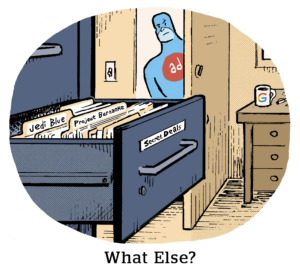Remember when all anyone in the online advertising industry could talk about was the end of third-party cookies in Chrome followed by Google’s sudden reversal?
Feels almost quaint now in light of Google’s defeat on Monday in the DOJ’s landmark search antitrust case.
US District Court Judge Amit Mehta, who presided over the trial, found that Google is a monopolist in two markets: general search engine services and general search text ads.
Somewhat perplexingly, Judge Mehta did not go so far as to find that Google maintains a monopoly in the general search advertising market because he doesn’t consider it to be a distinct market and therefore can’t be monopolized.
Even so, the judge’s ruling is a major blow to Google, which has now been branded as a monopolist twice: in this search case (which Google has vowed to appeal) and back in December when it agreed to pay $700 million in the Epic Games case to settle allegations that it runs an illegal app-store monopoly.
For now, though, we await the next phase of the Google Search drama, which will involve a separate legal proceeding for the court to decide on remedies for Google’s unlawful conduct.
In the meantime, Judge Mehta’s ruling, which is chock-full of zingers, is worth a read in full.
But in case you don’t have time to digest a 286-page legal document, we went through it and pulled out a few spicy and noteworthy nuggets for you to chew on.
Ad dolla dolla bills, y’all
Judge Mehta spends a lot of time in his ruling talking about Google’s default distribution agreements with device makers, including Apple and Samsung – and for good reason.
Being the default “is extremely valuable real estate,” Judge Mehta writes, “because many users simply stick to search with the default [and] Google receives billions of queries every day through those access points.”
Those billions of queries translate into “extraordinary volumes of user data,” which translate into billions of dollars in ad revenue.
From the ruling: More users mean more advertisers, and more advertisers mean more revenues. As queries on Google have grown, so too has the amount it earns in advertising dollars. In 2014, Google booked nearly $47 billion in advertising revenue. By 2021, that number had increased more than three-fold to over $146 billion. Bing, by comparison, generated only a fraction of that amount – less than $12 billion in 2022.
Increasing prices without fear
And no wonder ad revenue has been doing that hockey-stick thing.
In a section of Judge Mehta’s ruling somewhat dryly entitled “Exclusive Agreements Allow Google to Profitably Charge Supracompetitive Prices for Text Advertisements,” this little zinger appears:
From the ruling: The only apparent constraint on Google’s pricing decisions are potential advertiser outcry and bad publicity. … Through barely perceptible and rarely announced tweaks to its ad auctions, Google has increased text ads prices without fear of losing advertisers.
(h/t to Sarah Kay Wiley from Check My Ads for surfacing this excerpt on LinkedIn.)
Missing the forest for the ROI
Although the DOJ failed to convince Judge Mehta that Google operates a monopoly in the general search advertising market, he didn’t seem to wholly buy into Google’s defense.
The DOJ had argued that advertisers don’t substitute other media for search ads even when faced with price hikes. Google countered that advertisers care more about ROI or return on ad spend than they do about spending in any particular advertising channel.
But Google’s “focus on ROI misses the forest for the trees,” Mehta writes.
From the ruling: Google points out that advertisers increasingly are using tools like its own Performance Max, which helps advertisers optimize their ad spend to yield the best ROI. … To be sure, advertisers did testify to shifting spend to maximize ROI. But none said that they have “significantly” shifted ad spend away from search ads.
In fact, the opposite is true. Advertisers uniformly said that they would not substitute search ads for another ad type absent some campaign-level reason to do so.
Not that advertisers have a choice. Automated and AI-driven black-box ad platforms like PMax are the way of the future.
 The search engine ecosystem is basically frozen in place
The search engine ecosystem is basically frozen in place
But back to those exclusive default search contracts, like the $20 billion annual distribution deal between Google and Apple. They may have been bad for consumer privacy.
It’s just another example of the potential negative downstream impacts that can happen when a single player dominates a market.
The ruling observes that “as a result of the extraordinary resources required to build, operate and monetize a [general search engine], venture capitalists and other investors have stayed away from funding new search ventures.”
Even well-funded and talented teams, like the one behind Neeva, couldn’t make a go of it. Neeva was the ad-free and privacy-focused generative-AI-powered search engine founded in 2019 by Sridhar Ramaswamy, Google’s former and longtime head of search and ad products. It eventually failed.
The court found Ramaswamy, who testified during the trial last year, “to be a particularly compelling witness,” Judge Mehta writes.
From the ruling: [Ramaswamy] put it best. When the court asked why Google pays billions in revenue share when it already has the best search engine, he answered that the payments “provide an incredibly strong incentive for the ecosystem to not do anything.” … Their “net effect … [is to] basically freeze the ecosystem in place.”
No one would ever describe a competitive marketplace in those terms. When the distribution agreements have created an ecosystem that has a “strong incentive” to do “nothing,” is “resist[ant] to change,” and is “basically [frozen] in place,” there is no genuine “competition for the contract” in search. It is illusory.
Snowflake acquired Neeva last year and shut down the consumer-facing part of the service shortly thereafter.
An opportunity for innovation RIP.
















